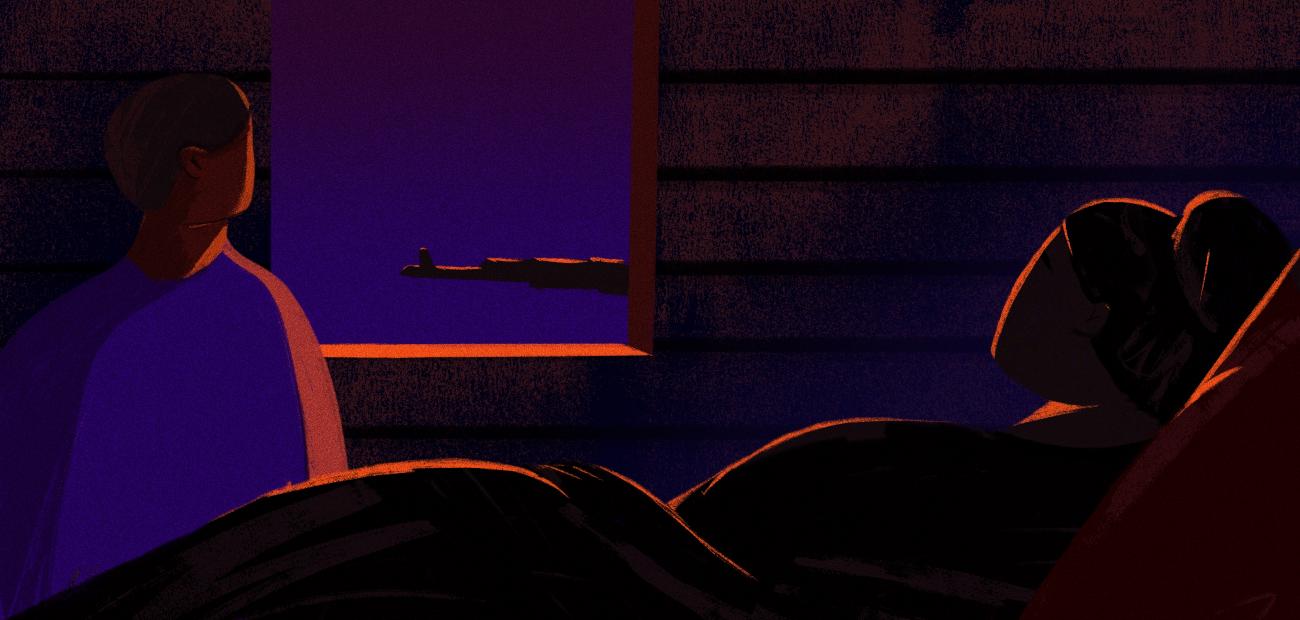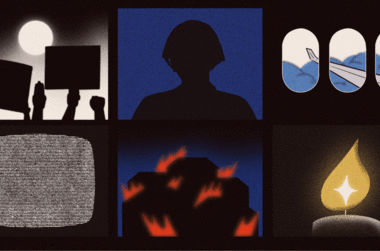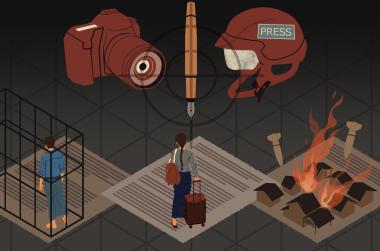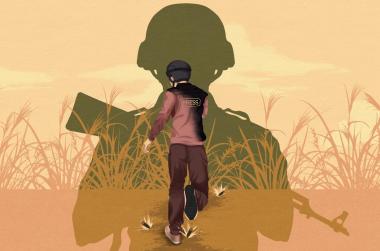The author is a Chin journalist who is receiving support from The Kite Tales to write these diaries.
The rain is heavy and peppered with hail. On hazy days at home in Mindat, southern Chin State, one can hardly see the person in front. This is even worse.
The thatched hut we are living in couldn’t withstand the rain and the wind, and so it flooded. Now it is cloaked with a blue tarpaulin. Inside the cries of the baby mix with the sound of thunder.
I guess we’ll have some stories to tell the children as they grow up.
"When you were little, we had to flee to the jungle and to the mountains because the military was mad for power,” I will say.
I’ll tell them about hiding from gunfire, about how homes were burnt. And how their mother gave birth one terrifying night in the middle of all this fear and fighting.
She is trying to breastfeed the baby as the rain lashes down outside. She is angry.
"It is thanks to your elders, that we are on the run and suffering,” she says.
I am not a supporter of the military, but it used to be that whenever I saw news reports saying soldiers had burned down homes, entered villages and stolen people's belongings, solar panels and batteries, or killed animals raised by the villagers for food, I would always say: “I don’t think the army would do that. This is not possible.”
I can no longer say I don’t believe their crimes. I have to accept my wife’s anger.
I never thought I would become a refugee. I used to think refugees were on the Karen border (in the east of Myanmar) or in Kachin State in the north. Now I am running too.
What would make us flee our home?
After the military seized power on February 1, 2021 everyone in Mindat took to the streets.
It was the first city in Chin to take up arms, in an uprising with Tumi rifles - traditional single-shot rifles. There was also a very high proportion of government workers who joined the civil disobedience movement (CDM). Some departments were still not able to function more than a year after the coup.
At one point the army entered the hospital compound and set up camp. But local people surrounded the soldiers and drove them out.
Another time, the military raided the home of a teacher taking part in the CDM. Within minutes, local youths surrounded the soldiers and they had to retreat.
My wife, a government employee, was pregnant at the time but immediately joined the CDM when the coup happened. She stopped working and didn’t take her maternity leave benefits.
A large number of staff from the health and education departments in the city joined the civil disobedience movement and by the time my wife reached her due date, her obstetrician had fled home to the southern plains.
Hospitals and clinics were also closed so CDM nurses got together and opened an unofficial clinic. The delivery room was the hastily re-appropriated dining room on the first floor of a two-storey building, partitioned with plywood for privacy. In this room was just a chair from a beauty salon normally used for people having their hair washed. There were no doctors, only nurses. There were no medicines, and no painkillers.
This is where my wife gave birth.
It was a terrifying time. If there were any complications, there was nothing to help her in an emergency. I was wavering between whether I should try to hire a car to attempt the drive to a bigger city or just stay put.
The military had started to arrest people associated with the CDM clinics. The only protection we had was a group of young men from the neighbourhood, who crouched in the darkness at the top of the stairs wielding whatever weapons they could find.
My wife was in labour and had started contractions when a military vehicle and a police patrol car stopped on the street below. The youths went deadly quiet.
The nurses told my wife: “Be patient and wait for a bit. Do not shout. We don’t want these military dogs to come up."
I was sweating. What would I do if these guys did come up? Our neighbourhood protectors were ready for a fight if they tried, but I panicked that my wife would be terrified.
After what seemed like an hour but was probably about half an hour, the vehicles drove away.
And almost as soon as they left, my wife gave birth.
The baby howled and howled in a very loud voice. Thanks to God, he was born strong and healthy and without any complications.
What a memory.

There had been some negotiations going on between the military, town elders and religious groups, but after the army started arresting young people the fighting began.
Our eldest child was just over two and the baby was a few months old. At the sound of gunfire or artillery fire at night, all the houses in the city would switch off their lights. The army shot at houses who didn’t do this. But the baby cried as soon as the light went out. We were terrified that they would hear the weeping, so we all hid together under a thick blanket.
People who were not taking part in active combat started fleeing to nearby villages. Because the monsoon rain made it impossible to travel by car, people had to flee on small roads suitable for bikes. It was really upsetting that we couldn’t help each other, because everyone was struggling.
At first, we made our way to a nearby village. Then the army came and we had to pack up and run. We moved to another village we thought was safe, but the same thing happened and we had to move a third time. Eventually we came to the village where we now stay.
It has been more than a year since we’ve been displaced. I want to go back to our home in Mindat.
The army is going house-to-house conducting a census in the city (ed- as it has been doing in other regions) and calling for people to return. But no one dares to go back.
Even if you stay indoors with the door locked, they can force their way in and check your phone. In one case, we heard that soldiers found a picture of a gun on someone’s phone and sentenced the owner to seven years in prison.
Local sources say more than 40 people have been arrested by army Battalion 274 and imprisoned using military tribunals.
More than 10,000 people are estimated to have fled Mindat and are taking refuge in villages nearby, according to local sources. There are more than 50,000 people in Mindat Township, so that would be about a quarter of the population. The military councils set up 10 refugee camps in the city but there are more refugees in the villages.
There have also been reports that aid agencies tried to provide rice to IDPs but they were not allowed to visit actual refugee camps in villages and instead were only allowed to help the refugees recognised by the military. As a result, real refugee camps outside of urban areas are in need of food and shelter.
This is our second monsoon here and the rains pound heavily on the fragile roof of our hut.
Living here isn’t easy, we are always on edge. Whenever we hear news of an army column approaching, we have to cover our belongings with tarpaulin and flee to the fields. It is very distressing.
The military is still fighting the people. So I’m pretty certain that I will continue to see scenes of people frantically wrapping their food and running for their lives.
Artwork by JC who is receiving support from The Kite Tales to produce illustrations.





